The Great British Beer Festival (GBBF), organised annually by the Campaign for Real Ale (CAMRA), is a remarkable event. This year almost 67,000 people, about 5% more than last year, drank about 114,000l (200,000 pints) of over 700 beers, faciliated by over 1,000 volunteers. This makes it the biggest event of its kind in the world. Its nearest competitor, the Great American Beer Festival (GABF), taking place in just over a month’s time, is expected to welcome 49,000 people — the beer choice will be much wider, but only available for tasting in miniscule measures.
The event easily fills the windowless cavern of Earls Court, Central London’s biggest exhibition venue, to occasionally uncomfortable levels, with an impressively broad spectrum of beer drinkers. It’d be silly to pretend you don’t see anyone conforming to the popular stereotype of the CAMRA member, but they are very much the minority. The crowd covers a range of ages, a decent balance of gender (though still a bit heavy on the XY chromosomes) and even makes a respectable stab at ethnic diversity. Beer bellies in worn ‘Afraid you might taste something Lagerboy?’ T-shirts and twitchy ticking geeks rub shoulders with normal people out with mates and colleagues; suits and power frocks mix with punky-haired surf types. The dressers for fun range from fabulously stylish — a file of women in glamorous vintage evening wear wafted down the escalator from the members’ lounge — to embarassing — the business suited young man dressed to appear as if he had a giant furry penis stuck through his head hit a new nadir in the unfortunate festival tradition of “wacky” headgear. But everyone gets on in a good natured way. It’s signficant that, given the amount of alcohol consumed, this huge event is remarkably trouble-free, a fine advertisement for our capability to drink responsibly if we choose.
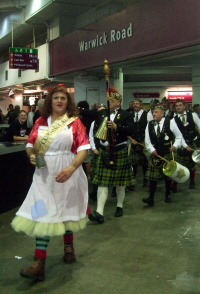 The festival inevitably embodies some of the contradictions of the organisation that runs it. CAMRA’s official priority is to promote British cask beer, with bottle conditioned and/or imported craft beers, plus real cider and perry, as a footnote. But the festival has become an international celebration of beer itself, with the imported beer bars, Bières sans frontières (BSF), an attraction in themselves, a rallying point for the worldwide craft brewing community, of which more later. CAMRA does recruit at the festival — this year it signed up about 1,000 new members — but it still struggles to connect with the majority of visitors. Most are there to enjoy good beer in good company, in the same way they enjoy other fine things in life, and aren’t too worried about matters such as the amount of foam on their pint, or whether or not Marstons’ new Fast Cask system of jellied yeast pellets counts as real ale.
The festival inevitably embodies some of the contradictions of the organisation that runs it. CAMRA’s official priority is to promote British cask beer, with bottle conditioned and/or imported craft beers, plus real cider and perry, as a footnote. But the festival has become an international celebration of beer itself, with the imported beer bars, Bières sans frontières (BSF), an attraction in themselves, a rallying point for the worldwide craft brewing community, of which more later. CAMRA does recruit at the festival — this year it signed up about 1,000 new members — but it still struggles to connect with the majority of visitors. Most are there to enjoy good beer in good company, in the same way they enjoy other fine things in life, and aren’t too worried about matters such as the amount of foam on their pint, or whether or not Marstons’ new Fast Cask system of jellied yeast pellets counts as real ale.
These contradictions are contained — just — by the de facto overlap between “real ale” and fine beer in the UK, but that is increasingly coming under (CO2) pressure. This year I went for the first time to the British Guild of Beer Writers’ pre-festival reception on the Monday night. On a temporary stillage in the large back room at Brew Wharf in the Borough was a good range of casks from brewers in and around London, and at the end of these a couple of lonely keg taps which piqued my curiosity. They were dispensing beers from the Camden Town brewery, an outfit newly expanded from a small plant at the Horseshoe pub in Hampstead. One was an excellent Helles, the other an American-style pale ale. I was introduced to the Australian brewery owner and his head brewer, a young Dane, neither of whom have any special loyalty to cask, but they do have a determination to produce quality characterful beer. The fact that it wouldn’t be allowed at a CAMRA festival on technical grounds while clearly inferior products would is one thing I hope the forthcoming review of CAMRA’s policy and direction will have the courage to address.
That’s not to say that the quality of good cask beer is anything less than breathtaking. The offer at the Beer Writers’ evening included some winners: East London’s Brodie’s continued to dazzle me with their Summer Stout, absolutely packed with flavour and yet only 2.7% ABV. The Champion Beer of Britain (CBoB) final, which takes place at GBBF, also affirms the potential of British cask ale at its best. This year’s list of category winners was impressively diverse in number and type of breweries. The overall gold and silver medallists, respectively Castle Rock Harvest Pale and the well-known Timothy Taylor’s Landlord, are both outstanding, and contrasting, examples of top notch cask.
And yet, regarding the massed ranks of pale and golden ales of between 3.5% and 4.8% ABV that still form the majority of beers on offer at the British bars, this year arranged rather bafflingly according to “counties” of the organisers’ own devising, I couldn’t help but think British brewing needs an injection of excitement, experimentation and pizzazz. There’s a buzz to the BSF bars, a sense of adventure and discovery, that doesn’t quite extend to the rest of the hall (I can’t speak for the cider and perry bar as it’s beyond my expertise). There are plenty of British brewers among the drinkers but the BSF bars attract brewers and brewing personalities to volunteer. Menno Olivier of De Molen at Bodegraven near Rotterdam is a regular visitor and this year brought three giant wooden casks of special editions. Alex Liberati, of Rome’s cutting edge Brasserie 4:20 beer pub and the Revelation Cat beer firm, was conducting informal tastings of Italian craft brews. And thanks to an expanded partnership with the Brewers’ Association, GBBF this year had its biggest ever range of US craft brews, including around 100 in cask.
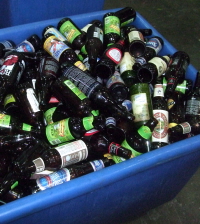
Great British Beer Festival 2010. Hundreds of unusual US craft brews but the punters still go for the tried and tested!
More special and unexpected attractions such as this could be strategically spread around the festival — genuine ones, not the ticker beers that blight some CAMRA festivals. The British Real Ale in a Bottle Bar, though staffed by hard working volunteers and with a great selection which always claims some of my carry out allowance, could do with some more unusual brews and perhaps some spontaneous tastings and brewer involvement. Fuller’s did its bit by releasing a firkin a day of the rare cask version of Brewers Reserve No 2 aged in cognac barrels at its brewery bar. Thornbridge, one of the most adventurous British brewers, had a brewery bar for the first time but played safe by concentrating on its cask session ales, rather than the amazing wood aged imperial stouts it had at the Pré-ZBF event in Flanders back in March.
One new perspective I enjoyed this year was volunteering for the first time — I spent the Wednesday behind the BSF Belgian, Dutch and Italian bar. As you’ll recall from the statistics quoted above, that makes me one of over 1,000. If you’ve been to GBBF you’re probably at least dimly aware that it’s run by this huge army of volunteers, but you may well not have thought through exactly what that means. I hadn’t either, until I became a volunteer and started thinking about the immensity of it all. It’s physically brought home to you when you walk through the staff entrance opposite West Brompton tube and go up to the 5300m², 2000-capacity Brompton Hall on the first floor, which serves during the festival as the Volunteer Village, complete with its own bar, the Volunteer Arms.
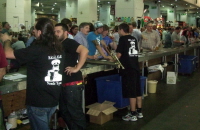
Great British Beer Festival 2010: the view from the other side of the bar, in this case the BSF Dutch/German/Italian one.
The festival organiser, Marc Holmes, is himself a volunteer, and under him is a well organised structure of coordinators, managers and rank and file, all working with the sort of efficiency and smoothness that would do a professional events company proud, except that a company would charge serious money for delivering something of this size. Sometimes activities run by long standing volunteers can be a bit cliquey and unwelcoming, but at GBBF quite the reverse was the case. Everyone was lovely — and I know some of them recognised my name, but I genuinely think they would have been as nice to anyone.
Working behind the bar was both an enjoyable and a beneficial experience. Bar manager Roger explained that the customers split broadly into two groups: seasoned beer hunters who know exactly what they want, and people trying new things that need advice and recommendations. I was glad to deal with both, but it was good to meet those in the latter group, given that most of the people I discuss beer with are geeks like me. I knew for example, about the popularity of fruit beers with people who aren’t hardened beer drinkers, but it was very instructive to see it in action. It’s made me realise that one day I really must try a bottle of Drie Horne Bananatana. I was hoping to serve one to Penis-Head, but he asked for the best beer on the bar and my honesty compelled me to sell him a bottle of Rochefort 10.
Festival web pages: http://gbbf.camra.org.uk
Beer picks
- Brodie’s Summer Stout 2.7% London E10, England
- Camden Town Helles 4.8% London NW5, England
- Rebellion IPA 3.7% Marlow, Buckinghamshire, England
- Fuller’s Brewer’s Reserve No 2 7.7%, London W4, England
- Port Older Viscosity 2009 12.5% San Marcos, California, USA
- Molen Revelation Cat Whole Milk Mild 3.5% Bodegraven, Zuid-Holland, Netherlands

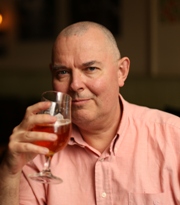
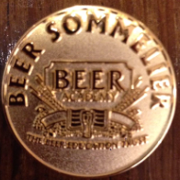
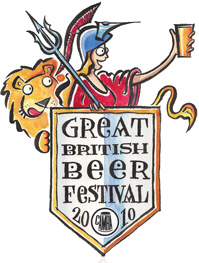
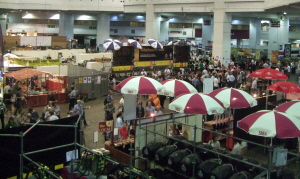
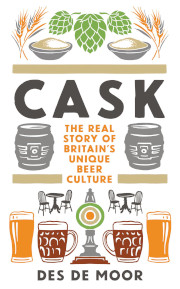
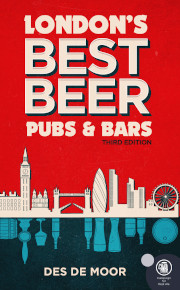
Great piece Des.
Wish we could have been more adventurous with our cask ales this year, but was up to CAMRA to pick the beers. Hopefully next year, they’ll let us push our more innovative stuff! (Fingers crossed!!!)
A great article, cheers DES,
Kelly
Thornbridge
Thanks Kelly. I didn’t realise it was up to CAMRA to pick the beers on the brewery bars. I hope it worked well for you having the bar there — I still enjoyed the third of Kipling that I was served there!
Like you this was my first time as a GBBF volunteer – helped with the beer delivery over the set-up weekend and then working on the same BSF bar as you but on Tues and Thurs so just missed you.
I had a great time and will be back to help out again next tear…
Hi Des,
I enjoyed the beers at the monday bash at The BrewWharf, and was particularly impressed with his 3.8% ABC – definitely punched above its weight.
I didn’t manage to get to Earls Court until Saturday by which time many of the bars were closed or closing due to the ales being sold out. One barman suggested (at noon) that 80% had sold out. By 1pm the crowd around the Czech portion of BSF was massive – interesting in that just ten years ago those draught lagers would not have been allowed.
We left at about 2:30 on Saturday, and there were still crowds piling in. I suspect CAMRA weren’t offering reduced admission as the range of beers available was so severely limited.